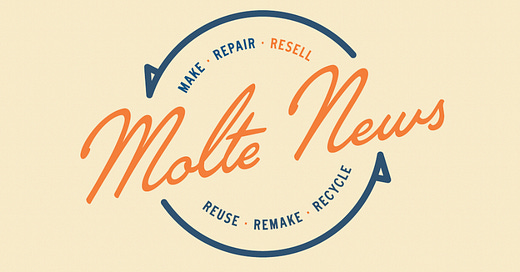I haven’t written something about resale in a while, but I still talk about it often with colleagues and clients, especially lately re: branded resale vs marketplace resale.
People are wondering if brands should and will continue to launch branded resale programs or if they will choose to work within established marketplaces like Poshmark and ebay (either directly or indirectly). Somebody recently asked me which is better- branded resale or marketplace resale- and of course the answer is different for every brand. When it comes to resale there is still no clear “if this then that” decision-making process, it’s dependent on how each brand thinks about their priorities, their strategy and how resale would either help or potentially detract from those strategies.
Some brands choose to have a branded resale collection as part of their website experience for their customers. They want their customers to experience resale through the lens of their own brand experience, not through a marketplace. They want customers to purchase directly from them. This can be very well executed if the brand truly stands behind their product and is happy that a customer buys product from them regardless of if it’s new or used. In my opinion, this is the only way branded resale should be executed. Some brands behave this way, but in my experience, many brands do performative resale where they have a resale collection that they don’t drive any traffic too, and they don’t really care how it performs. In those cases I would say it’s just a waste of time and energy to have a branded resale collection.
On the other hand, some brands will choose to work with a resale marketplace like Poshmark or eBay sell their imperfect and used products. Brands want to work with marketplaces for different reasons; they may want the learnings and the revenue from resale, but they don’t want the hassle or headache of having to manage it themselves or market it themselves, and they can take advantage of the huge audiences that those marketplaces have worked hard to earn. A recent example of this is Everlane on Poshmark. A marketplace can be a great way to sell items in a more controlled manner instead of just selling them to a jobber who will sell them 10 different ways, usually without transparency. A brand can work out an agreement with a marketplace for how their product will be sold and at what discount.
I think there is absolutely space for both of these approaches. There has been a huge focus on branded resale, and now there is a growing and deserved focus on marketplace resale in partnership with brands.
Another notable intersection of these worlds is when a resale software company who powers branded resale leverages a marketplace to help increase eyeballs and sell through of their items, i.e. ‘cross listing’. When you list an item for sale on multiple marketplaces and a branded resale page, there is a higher chance it will sell faster. For example, this is Trove’s UK Recommerce ebay site. Trove is the resale software company who is partnering with brands to offer branded resale, but they have also dipped their toes into the world of big-audience marketplaces, a real smart move in my opinion!
Honorable mentions to smaller marketplaces run by resale software companies like The Again Co’s notnot marketplace and Comeback Goods. The uphill battle with these types of smaller marketplaces is getting enough people to find them, which is another reason we should be seeing cross listing between marketplaces growing for all industries. Some of these types of marketplaces have failed in the past, but I think especially with cross listing and the consumer desire for deals on quality goods, they have a great chance of succeeding.
That’s it for today,




We also have to consider traffic and incentives. If a brand goes down the path of branded resale, they need to market this. For the most part they rarely do and as a result see little traffic and set themselves up for a "see I told you this wouldn't work." By contrast, the marketplaces have strong incentives to market their platforms. It is their core business. ThredUp, Vinted, and recently Amazon Luxe all have strong incentives to promote their marketplaces and attract buyers and sellers. The circular economy needs merchandizing just as much as the linear economy. From what I've seen, marketplaces have a much stronger incentive to do this than branded resale.